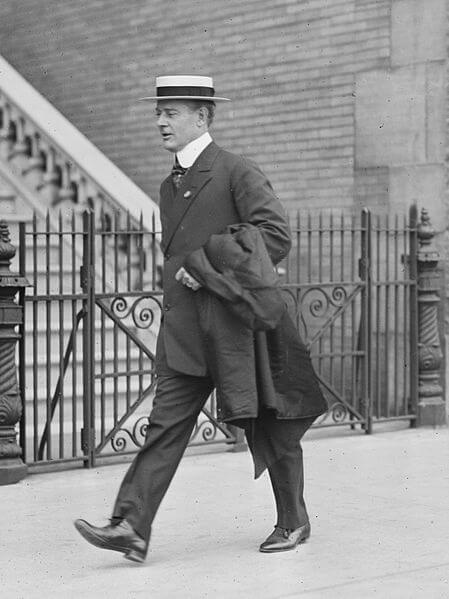By Llewellyn King
Men’s hats bit the dust in the time of Jack Kennedy. Oh, sure, there are baseball caps and various ersatz chapeaux to keep the top of a man cool or warm. But they aren’t grand symbols of taste on the head: boaters, derbies, fedoras, homburgs, panamas, trilbies and — forgotten glory — silk top hats.
More recently, the bell has tolled for the necktie — that useless but delightful fashion option for men. Who ever complimented a man on his unadorned neck?
I blame Hollywood and the whole state of California for suppressing fashion by promoting the idea that casual dressing is superior. The Golden State has upended the decent order of all things sartorial for men; reduced us to looking like bums in shapeless clothes emblazoned with the manufacturer’s name.
What became of the well-fitting — bespoke, if possible — suit or blazer, craftily cut to minimize bulge around the waist and maximize size at the shoulder? What of the fine shirt in linen, poplin, French twill, silk or even broadcloth? What has replaced the sense of social perfection of a man showing his cuffs in a double-breasted Melton blazer?
This decline in the male wardrobe I’ve borne with fortitude. But I believe that wardrobe disassembling has hit its nadir: men wearing suits without socks. Enough, enough, enough!
A senior executive of a California company, of course, showed up sans socks for a taping of my television program. I’ll give the man his due: he wore a decent suit, a passable shirt and a power tie. His feet supported quality loafers. But why no socks? Does anyone admire the male ankle? Is it a thing of beauty? Have I missed out on the charm of this lovely body part?
That horror wasn’t an isolated event: Recently, I dined at a French restaurant in Boston with a distinguished citizen — an ambassador plenipotentiary to a European country, no less — who wasn’t wearing socks. Does the State Department know? Is there a protocol for ambassadorial dress? Can down-dressers be rebuked? Is this matter addressed in Hillary Clinton’s copious emails? We should be told in the president’s Saturday broadcast whether the nation is going to be allowed to go down the sartorial drain.
I’ve been checking out Chinese dignitaries. Every last one of them, as far as I can determine, wears socks. Even Russian President Vladimir Putin transgresses international standards of statesmanship only from the waist up. Shoes and socks prevail for this improbable Tarzan.
The passion to be casual is causing actual hardship. Nobody knows what to wear at important events. Some years ago, I participated in a U.S.-Japan business forum in Hawaii. The U.S. delegation head decided that polo shirts would be appropriate attire for men. But his dress decision didn’t reach the Japanese delegates, and they all wore suits. After lunch, though, the Japanese went casual and the Americans donned suits. Mutual red faces.
Does anyone really think a partner or associate in a big law firm feels good with his tummy rolls accentuated by a knit shirt advertising a crocodile? For women, this casual thing is a refined cruelty. You work like hell: law school, junior legal slave, and finally — hosanna — partner. Time for a fabulous Chanel suit, patent leather-toed slingbacks and heaps of pearls.
Not so fast. The managers have decreed it’s time to go casual, to bring out the jeans. The law-school look for work.
We have to make America look as if it cares again. Therefore, I won’t vote for any presidential aspirant who, if male, doesn’t wear a tie or plunges his feet into loafers without socks; or who, if female, wears flats and eschews leg and foot coverage. I’m saving my vote for a sartorially principled candidate. — For InsideSources.com


